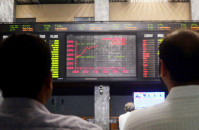Pakistan, IMF complete sixth review for EFF programme
Both sides reach agreement which will allow IMF to go to its board for releasing $518 million to Pakistan

The IMF has agreed to reduce the FBR’s tax collection target to Rs2.691 trillion against the original target of Rs2.810 trillion. PHOTO: PID
It was not immediately clear whether the government will cut Public Sector Development Programme by the same amount or the budget deficit ceiling of 4.9% of the GDP will be relaxed.
Finance Minister Ishaq Dar and outgoing IMF Mission chief to Islamabad Jeffrey Franks announced successful conclusion of the sixth review of the economy on Thursday, despite the government’s failure in introducing energy and taxation reforms and giving autonomy to the State Bank of Pakistan (SBP).
"The IMF has agreed to reduce the FBR’s tax collection target to Rs2.691 trillion against the original target of Rs2.810 trillion," said Dar.
He claimed that FBR’s performance was marred by a reduction in petroleum products prices and lower inflation that affected revenue collection. But, the finance minister argued that this had in turn helped to contain the current account deficit in the balance of payments.
However, Dar’s assertion appeared faulty as the government claimed it would sustain Rs68 billion shortfall in revenues, out of which it will recover Rs28 billion, after it increased sales tax on all petroleum products to 27% against the standard rate of 17%.
Since beginning of the current fiscal year, independent economists have criticised the government for setting an unrealistic target of Rs2.810 trillion. Despite lowering the target to Rs2.691 trillion, officials in the FBR and economists are skeptic of the machinery’s ability to achieve this target.
Franks said both sides had agreed on steps to boost FBR revenues going forward, however, he did not explain what these new steps will be.
The IMF mission chief said that measures to reduce tax loopholes had borne fruit but lower FBR revenues means more efforts were needed to achieve targets of Rs1.195 trillion for the first half of the fiscal year.
On the other hand, Dar claimed that the government had achieved all the performance criteria, indicative targets earmarked in the programme and met the structural benchmarks.
Franks argued that while there was overall improvement in Pakistan’s economy all end-December performance criteria were met invalidating need for waivers, efforts should be made towards building up foreign exchange reserves. He also called for more efforts to afford more autonomy to the SBP.
Dar said successful completion of negotiations will enable the IMF to go to their board for the release of seventh tranche of about $518 million.
He claimed that completion of the sixth review was indicative of government’s commitment in implementing structural reforms in the areas of taxation, energy, monetary and financial sectors and public sector enterprises.



















COMMENTS
Comments are moderated and generally will be posted if they are on-topic and not abusive.
For more information, please see our Comments FAQ